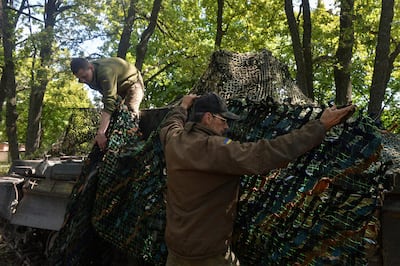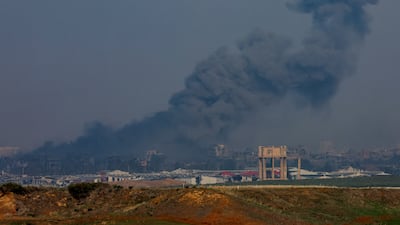Live updates: Follow the latest news on Israel-Gaza
A increase in more protracted conflicts is being driven by third party states and armed groups, the International Institute for Strategic Studies said on Wednesday.
Launching the Armed Conflict Survey 2023, the London-based institute (IISS) said the global landscape is being characterised by increasing intensity and intractability of conflicts.
It warns of the "growing clout" of non-state armed groups (NSAGs) as conflict parties and political actors ''against a backdrop of declining state legitimacy and reach" and says they are becoming "more globalised" due to international support from third party states.
The Armed Conflict Survey 2023, which provides an exhaustive review of the political, military and humanitarian dimensions of armed conflicts globally in the period from May 2022 to June 2023, says these factors have led to a rise in the intensity of global armed conflicts, making conflicts such as the one in Ukraine more protracted in nature.
It is presently estimated that 200 million people around the world live in areas controlled to different degrees by these 460 armed groups.
In some of its major findings, the report says that Syrian President Bashar Al Assad and the Houthis are not going to be defeated militarily in the current climate.
Last month France issued an international arrest warrant for President Assad on the grounds of complicity in war crimes and crimes against humanity over chemical attacks in 2013.
"In Syria and Yemen, the international community is beginning to recognise what has long been obvious to most observers: Assad and the Houthis are not going to be militarily defeated by the current configuration of forces opposing them and are unwilling to give way at the bargaining table what they have won on the battlefield," the report says.
The report says Iran's unofficial backing of a number of groups from Syria and Yemen to Iraq and the Palestinian Territories is playing a significant role.
"Perhaps the most important security coalition in the Middle East is the unacknowledged and unofficial coalition of Iran-backed groups," it says.
"Iran-backed actors have played a significant role in many of the region’s wars. Moreover, at least currently, many of these groups appear to be winning."
Emile Hokayem, the Director of Regional Security and Senior Fellow for Middle East Security at the IISS, said the key player in the Israel Gaza war is Iran but says the ultimate deciding factor in winning the war or not will be Israel.
“I assess there is unwillingness in Iran to escalate its interest and it is allowing its partners with plausible deniability,” he said.
Looking at Ukraine, the report says that the diplomatic deadlock and military stalemate in Ukraine points to a potentially protracted conflict and will affect humanitarian aid globally.
"The Armed Conflict Survey 2023 continues to capture a world dominated by increasingly intractable conflicts and armed violence amid a proliferation of actors, complex and overlapping motives, global influences and accelerating climate change,” it says.

"The recent global shocks caused by the coronavirus pandemic and the ongoing war in Ukraine have added to the woes of fragile states and regions, reinforcing root causes of conflict while curtailing resources available to address or at least mitigate them.
"Moreover, Ukraine’s unprecedented humanitarian and reconstruction needs are diverting ever more scarce international aid and development funding from other ongoing conflicts, which have been increasing in number over the last decade."
In terms of the future direction of the conflict, IISS' senior fellow for Russia Nigel Gould-Davies, said it will come down to resolve and resources.
“Ultimately the outcome for this conflict will be decided on the balance or resources and the balance of resolve," he said at the launch of the report in London.
"How much stuff does each side has available to pull into the conflict, and the West outstrips Russia."
He said the balance of of resolve will depend on budgets across the West.
The report has predicted that the issue of whether China will be able to use its economic muscle in the Middle East to advance its interests – while blunting those of the US – will be a key question for late 2023 and early 2024. "The Middle East will likely become an arena of intensified US-China competition in the years ahead, with significant consequences for the region’s conflicts," it said.
Al Qaeda franchises, such as Al Qaeda in Yemen, and ISIS-affiliated groups in Egypt, Iraq and Syria, continue to conduct low-level insurgencies, it says.
"However, no terrorist group in the region currently appears capable of controlling and administering territory as they did a decade ago in Iraq, Syria and Yemen," it added.


